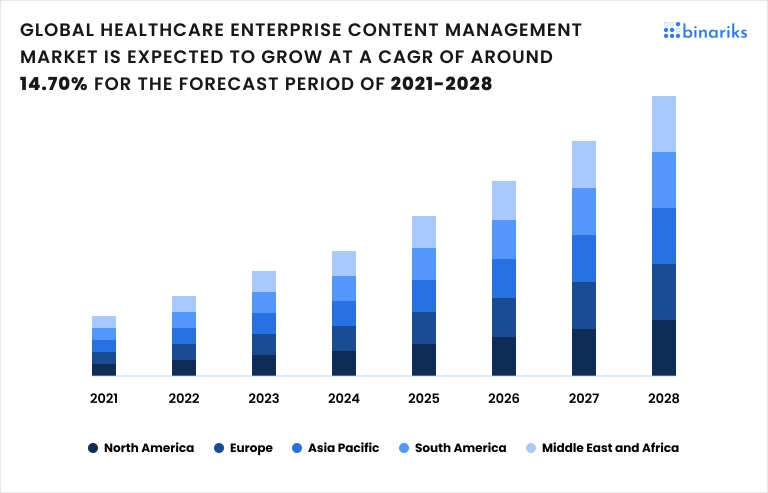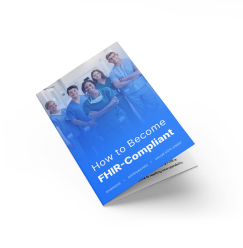Healthcare organizations are grappling with vast amounts of data and information that need to be efficiently managed, organized, and accessed. The implementation of a robust Content Management System (CMS) has emerged as a game-changer in the healthcare industry (source ).

At Binariks, we understand the critical role that healthcare CMS software plays in optimizing workflows and managing large volumes of data. With our expertise in software development and deep knowledge of the healthcare industry, we will help you address poor interoperability challenges, inefficient communication between providers, doctors, and patients and enhance patient-centered care.
In this article, we delve into the world of CMS for healthcare, exploring its advantages, key features, and selection criteria, uncovering its transformative potential for healthcare organizations striving for efficiency.
Content management systems in healthcare
Unlike generic CMS platforms, those designed specifically for healthcare cater to the unique requirements and complexities of the medical field.

An effective healthcare CMS platform facilitates seamless collaboration among healthcare professionals, simplifies document management, and ensures easy access to patient records. It also enables secure data sharing, vital for effective communication between healthcare providers and patients.
Compliance with regulatory requirements, such as HIPAA, is more manageable through features specifically designed for privacy and security in healthcare content. Moreover, the right CMS empowers healthcare providers to leverage automation, intelligent search capabilities, and data analytics. It enables them to derive valuable insights for making informed decisions and tailoring patient care plans.
Thus, selecting the appropriate healthcare CMS platform is a decision that significantly impacts the efficiency, effectiveness, and even overall quality of healthcare services provided by a company. Let's delve deeper into the advantages of implementing a content management system for a healthcare organization.
Advantages of CMS implementation for healthcare organizations
CMS software for healthcare significantly enhances the efficiency and effectiveness of medical institutions and organizations. Here is a list of some advantages you can get:
- Streamlined Data Management: A healthcare CMS simplifies the organization and management of vast amounts of healthcare data, including patient records, medical images, and administrative documents. This streamlining ensures easy access to critical information, leading to quicker decision-making and improved patient care.
- Improved Collaboration: CMS platforms foster seamless collaboration among healthcare professionals by providing a centralized framework for sharing, reviewing, and updating patient information. This feature enhances communication and coordination among the care team.
- Enhanced Patient Care: With access to comprehensive patient records and medical histories, healthcare providers can deliver personalized care plans tailored to individual needs. The CMS aids in tracking patient progress, enabling timely interventions, and promoting proactive healthcare practices.
- Efficient Workflows: CMS software for healthcare automates routine administrative tasks, reducing manual efforts and minimizing errors. This streamlined workflow translates to increased productivity for healthcare staff, allowing them to focus more on patient care.
- Compliance and Security: Healthcare CMS platforms come equipped with features designed to meet regulatory standards, such as HIPAA, ensuring data privacy and security. This compliance minimizes the risk of data breaches and maintains patient confidentiality.
- Integration with EHR and RPM Systems: An essential advantage of CMS in healthcare is its ability to integrate with other critical systems, such as Electronic Health Records (EHR) and RPM. This integration promotes seamless data exchange and enhances the overall care experience for both patients and providers.
- Scalability and Flexibility: CMS platforms offer scalability, accommodating the growing needs of healthcare organizations. Additionally, they provide flexibility in adapting to evolving healthcare trends and technological advancements.
- Cost-Effectiveness: By streamlining processes, reducing paperwork, and enhancing productivity, CMS software for healthcare ultimately leads to cost savings for medical institutions.
Key CMS features for healthcare
The role of CMS in the healthcare system in streamlining operations and improving patient care should not be underestimated. And below are some key features enabling healthcare CMS to provide such benefits.
Content editor
An intuitive and user-friendly content editor is a cornerstone of any effective healthcare CMS. This feature helps content administrators to create, edit, and manage content effortlessly, ensuring that websites and patient portals are kept up-to-date with relevant information.
Workflow features
Efficient workflow capabilities are indispensable for a healthcare CMS as they help automate tasks and streamline content management processes. Workflow features enable organizations to establish predefined content approval processes, ensuring that all content undergoes proper review before being published.
This not only maintains content quality but also adheres to regulatory and compliance requirements. Workflow automation can also include content scheduling, and ensuring timely publishing of time-sensitive materials, such as announcements, events, or policy updates.
Dynamic content and personalized experiences
The ability of a healthcare CMS to deliver dynamic and personalized content is a powerful tool for engaging patients. By leveraging user data and behavior, the CMS can present relevant content based on individual preferences and demographics.
Personalization can extend to customized user interfaces, appointment reminders, and tailored health education materials.
Flexibility and scalability
A healthcare CMS should be built with flexibility and scalability in mind, allowing it to adapt to changing business requirements and future growth. It also should accommodate expansions in services, new departments, and changing organizational structures without compromising performance or functionality.
Healthcare-level security
Security is of paramount importance in healthcare, where patient data must be protected against unauthorized access and potential breaches. A robust healthcare CMS should implement stringent security measures, such as data encryption, access controls, and user authentication, to safeguard sensitive patient information.
Compliance with healthcare industry standards, such as the Health Insurance Portability and Accountability Act (HIPAA), is non-negotiable for any healthcare organization. A healthcare CMS should support these security protocols and undergo regular security audits to ensure that patient data is kept secure and confidential.
Integrations
Seamless integration with other systems used by a healthcare provider, for example, EHR and RPM tools, is critical for ensuring a unified approach to patient care. Integration with EHR systems enables healthcare providers to access patient medical records directly from the CMS, streamlining the documentation process and minimizing duplicate data entry.
Similarly, integration with RPM tools allows you to monitor patients' vital signs and health metrics remotely, enabling timely interventions and proactive management of chronic conditions.
A robust healthcare content management system facilitates seamless communication and the delivery of personalized healthcare experiences, by capturing, handling, and storing both paper and electronic documents. When selecting a healthcare CMS, organizations should prioritize the above features to ensure efficient operations.
Want to become HIPAA-compliant?
Learn about best practices of FHIR implementation.

How to choose the best CMS for your healthcare organization
Selecting the best content management system for healthcare is a decision that can significantly impact the efficiency and productivity of your organization. With numerous options available in the market, it's essential to consider several factors to make an informed choice tailored to your healthcare needs.

First and foremost, start by evaluating your organization's specific requirements and objectives. Consider factors such as the size of your healthcare organization, the number of users who will interact with the CMS, the types of content you will manage, and the need for integration with EHR or RPM. Identifying these needs will help you narrow down your options and find a CMS that aligns with your unique requirements.
When dealing with sensitive patient data, ensuring compliance with healthcare regulations is paramount. Look for a CMS that offers built-in features and security measures to maintain compliance with strict regulations like HIPAA.
Features such as data encryption, access controls, audit trails, and user authentication are crucial for safeguarding patient information, maintaining privacy, and upholding the trust of your patients.
A user-friendly interface and intuitive content editing capabilities are crucial for efficient content management. Look for a CMS that offers a user-friendly dashboard, drag-and-drop functionality, and a WYSIWYG (What You See Is What You Get) editor. These features will make it easier for users with varying technical expertise to create and update content without the need for extensive training.
Choosing the right content management system in healthcare requires careful consideration of your specific needs, security requirements, scalability, and usability.
By prioritizing features that align with your organizational goals, you can make a well-informed decision that empowers your healthcare team to enhance collaboration and streamline content management processes.
Top 3 open and closed source healthcare CMS
Before delving further into the popular content management systems for healthcare organizations, it's worth understanding the differences between "closed-source" and "open-source" CMS.
Open-source CMS offers greater flexibility in pricing and coding, being free for anyone to use with a supportive community constantly improving the platform and plugins. However, it may lead to security issues due to constant changes.
On the other hand, closed-source CMS provides increased security but comes with higher fees and limited customization options. Each approach has its pros and cons, and the key is to choose the right one that aligns with your organization's needs and objectives. Now, let's explore three of the most widely-used CMS solutions in the healthcare industry.
Drupal
Drupal is a robust and highly customizable open-source CMS widely used to create a healthcare content management platform system (source ). With a strong community of developers and users, Drupal offers a wealth of modules and extensions to cater to healthcare organizations' unique needs.
Its flexibility allows for seamless integration with various healthcare systems, empowering organizations to deliver personalized experiences and manage complex content. Drupal's focus on security and compliance, along with its scalability, makes it an attractive choice for healthcare institutions looking to build powerful and feature-rich websites and patient portals.
Sitecore
Sitecore is a leading enterprise content management system in healthcare renowned for its advanced marketing and personalization capabilities (source ).
While primarily known for its use in the corporate sector, Sitecore has gained traction in the healthcare industry due to its robust digital experience platform. The CMS offers extensive features, including content personalization, customer engagement analytics, and omnichannel marketing.
Sitecore's closed-source nature ensures higher security standards and dedicated support. Healthcare organizations seeking a comprehensive, data-driven platform to deliver personalized patient experiences and targeted healthcare campaigns often opt for Sitecore's integrated solution.
WordPress
Although not specifically designed for healthcare, WordPress is a versatile open-source CMS often utilized by healthcare organizations for content management. Its vast ecosystem of plugins and themes allows healthcare organizations to create personalized websites, patient portals, and blogs with ease.
While Drupal and WordPress are popular open-source options with strong community backing, closed-source systems like Sitecore provide comprehensive solutions tailored to the unique needs of large healthcare enterprises.
Ultimately, the choice between open and closed-source CMS depends on an organization's specific requirements, resources, and long-term objectives.
Build compliant and secure RPM apps with healthcare software engineering experts
Integrating CMS and remote patient monitoring
CMS offers excellent opportunities for integration, including with RPM systems, to enhance the overall healthcare experience. By integrating an enterprise content management system in healthcare with RPM technology, healthcare organizations can create a seamless ecosystem for capturing, managing, and analyzing patient data.
At Binariks, we specialize in the customization, integration, and implementation of such systems in the healthcare field. Our expertise in bridging the gap between CMS and RPM empowers healthcare providers to efficiently monitor patients remotely, collect vital health data, and deliver personalized care plans.
By combining CMS capabilities with RPM technology, healthcare organizations can improve patient outcomes, reduce hospital readmissions, and optimize resource utilization.
Through our tailored solutions, we enable healthcare providers to harness the power of data-driven insights, enabling proactive interventions and informed decision-making. Integrating CMS and remote patient monitoring development brings the potential to revolutionize patient care, driving efficiency and innovation.
Final thoughts
A well-implemented healthcare CMS software can empower organizations to streamline content management, enhance patient care, and ensure compliance with industry regulations. The advantages of choosing the right CMS, including seamless collaboration, improved workflows, and enhanced patient experiences, underscore the significance of this technology in healthcare.
Reach out to us for more information , schedule a consultation, or explore similar solutions to transform your healthcare organization. Let us help you unlock the power of an efficient and innovative CMS that elevates your healthcare services and delivers exceptional patient care.
FAQ
Share

